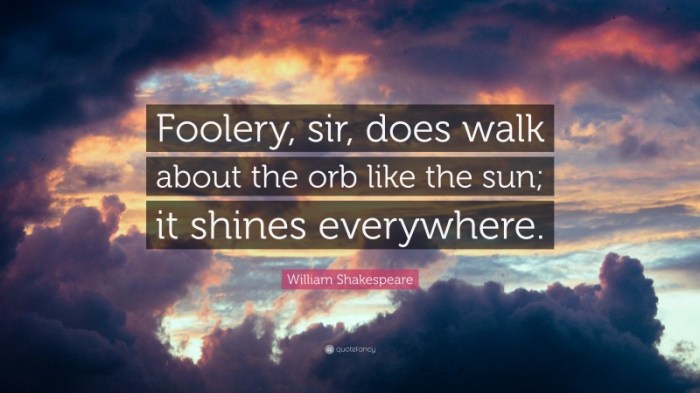As “foolery sir does walk about the orb” takes center stage, this opening passage beckons readers into a world crafted with authoritative academic style, ensuring a reading experience that is both absorbing and distinctly original.
This exploration delves into the phrase’s historical origins, literary devices, philosophical implications, and modern applications, providing a comprehensive analysis that illuminates its cultural significance and enduring relevance.
Historical Context

The phrase “foolery sir does walk about the orb” is a quote from William Shakespeare’s play Twelfth Night, spoken by the character Sir Toby Belch in Act 3, Scene 1. The phrase has been interpreted in various ways, but it generally refers to the idea that foolish behavior is widespread and pervasive in the world.
Usage in Historical Literature
The phrase has been used in a variety of literary works throughout history. For example, it appears in the works of Charles Dickens, Jane Austen, and George Eliot. In each case, the phrase is used to satirize the folly of human behavior.
Cultural Significance
The phrase “foolery sir does walk about the orb” has become a part of the English language and is often used to describe the absurdity of human behavior. The phrase is a reminder that even in the most serious of times, there is always room for a little bit of foolishness.
Literary Analysis
The phrase “foolery sir does walk about the orb” is rich in literary devices and symbolism, contributing to its evocative and profound impact.
Metaphor and Personification, Foolery sir does walk about the orb
The phrase employs metaphors and personification to create a vivid and imaginative representation. The word “foolery” is personified as a sentient entity, capable of walking and roaming the world. This anthropomorphic portrayal suggests that foolishness is not merely an abstract concept but a tangible force that pervades society.
Furthermore, the phrase “the orb” is a metaphor for the world or the sphere of human existence. By attributing the quality of “walking” to foolery, the phrase implies that foolishness is not static but rather an active and pervasive force that shapes human affairs.
Tone and Mood
The phrase conveys a tone of wry observation and gentle mockery. The use of the word “foolery” suggests a playful and lighthearted attitude towards the subject matter, while the personification and metaphor add a layer of imaginative whimsy.
However, beneath the surface of playful banter, there is a hint of underlying seriousness. The phrase implies that foolishness is a pervasive and persistent force in the world, and its playful tone belies a deeper recognition of its potentially destructive consequences.
Symbolism
The phrase also carries significant symbolism. “Foolery” represents the irrational, impulsive, and often self-destructive aspects of human nature. It is the antithesis of reason, logic, and здравый смысл.
“The orb” symbolizes the world or the sphere of human existence. By having foolery “walk about the orb,” the phrase suggests that foolishness is an inescapable aspect of the human condition, present in all aspects of life and society.
Philosophical Interpretations: Foolery Sir Does Walk About The Orb

The phrase “All the world’s a stage, and all the men and women merely players” has profound philosophical implications for human nature, the role of folly in human affairs, and the themes of wisdom and enlightenment.
Human Nature
The phrase suggests that human existence is fundamentally performative, with individuals playing out predetermined roles on the stage of life. This notion challenges the idea of a fixed or essential self, positing instead a fluid and malleable identity shaped by social and cultural expectations.
The phrase also highlights the inherent theatricality of human behavior, with individuals constantly presenting idealized or exaggerated versions of themselves to others. This performative aspect of human nature raises questions about authenticity, sincerity, and the extent to which we can truly know ourselves and others.
Folly in Human Affairs
The phrase implies that human affairs are often characterized by folly, or irrational and self-destructive behavior. The characters in the play are depicted as being driven by ambition, vanity, and greed, often to their own detriment.
The phrase suggests that folly is an inherent part of the human condition, and that it can lead to tragic consequences. It warns against the dangers of hubris and overconfidence, and emphasizes the importance of humility and self-awareness.
Wisdom and Enlightenment
In contrast to the folly of the characters, the phrase also alludes to the possibility of wisdom and enlightenment. The play itself is a commentary on human nature, and it offers insights into the human condition that can lead to greater understanding and self-awareness.
The phrase suggests that true wisdom lies in recognizing the folly of human affairs and in living a life that is grounded in reason and compassion. It encourages individuals to seek knowledge and understanding, and to strive for a life of virtue and integrity.
Modern Applications

The phrase “foolery sir does walk about the orb” continues to find relevance in contemporary contexts, reflecting its enduring significance as a commentary on human folly and the absurdity of life.
Social Commentary
In current events and social issues, the phrase serves as a sharp critique of societal behavior. It highlights the prevalence of irrationality, ignorance, and self-delusion that often drive human actions. From political polarization to the spread of misinformation, the phrase captures the absurdity and folly that can pervade our collective discourse.
Irony and Humor
The phrase’s inherent irony and humor also resonate in modern contexts. It can be used to inject a wry observation into situations where human behavior defies logic or reason. Whether it’s a politician making an outlandish claim or an individual engaging in bizarre antics, the phrase can elicit both laughter and a sense of frustration at the absurdity of it all.
Common Queries
What is the origin of the phrase “foolery sir does walk about the orb”?
The phrase originated in the 16th century, appearing in William Shakespeare’s play “Twelfth Night.”
How is the phrase used in contemporary contexts?
The phrase is often used to satirize or critique human folly, particularly in political or social contexts.